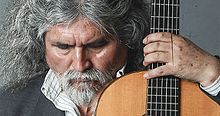Manuelcha Prado
Manuel Prado Alarcón , better known under the stage name Manuelcha Prado (born June 16, 1957 in Puquio , Lucanas Province , Ayacucho , Peru), is a Peruvian guitarist , singer , composer and collector of traditional songs in Chanka Quechua and Spanish .
Life
Manuel Prado grew up in the predominantly Quechua-speaking Puquio , where he attended secondary school (colegio) from 1967 to 1972 . His Kose and later stage name Manuelcha means "Manuelchen" (little Manuel) in Quechua in southern Peru . He started making music at the age of twelve, initially playing in various music groups and later as a soloist. From 1972 to 1973 he studied electronics at the Universidad Nacional de Educación Enrique Guzmán y Valle in Chosica and then anthropology at the Universidad Nacional Mayor de San Marcos in Lima . A role model as a folklore musician from the Ayacucho region and teacher for Manuelcha Prado was the guitarist Jaime Guardia . When Manuelcha Prado came to Lima from Puquio, he went to Guardia everywhere - "on the mountains, plains and sand," as Prado says - to ask his advice.
After his academic years, Manuelcha returned to Puquio and recorded numerous traditional songs while traveling through his home region Ayacucho , but especially in Puquio, on topics such as Wasichakuy (house building and roofing), Wawa Pampay (burial of children), Alba, Atipanakuy ( Fist fights, in other regions Takanakuy ), Docecobray , Wallpa Waqay (calling of the chickens), the Danza de las tijeras ("scissors dance "), Ayla (dance with the procession of young people at the festival of water), Torovelay ("worship of the bull", in Soras, Lucanas province), but also music from other regions of Peru, including Saqsaywamanpi ("in Saqsaywaman ") from the Cusco region . Most of the pieces from Ayacucho that he has collected, especially the Huainos , are traditionally sung with harp and violin accompaniment, but he reworked the music for guitar accompaniment. His first album Guitarra indígena was released in 1981 , and a year later he made his first international tour. A number of other albums followed, which made him internationally known as a Peruvian guitarist. Together with Raúl García Zárate and Javier Echecopar , he also published a songbook, Música para guitarra del Perú , which is widely used in Peruvian music schools.
Manuelcha Prado also sang some songs by the songwriter Carlos Falconí Aramburú , who also comes from the Ayacucho region , including Ofrenda (1982), a text in Quechua that describes the armed conflict in Peru from the perspective of the indigenous Quechua in Huamanga (Ayacucho). In 1996 Prado released the CD Romance guitarrero with Carlos Falconí .
Between 1978 and 1979, Manuelcha took part in two plays that were dramatizations of stories by the writer José María Arguedas : Amor Mundo and Yawar Fiesta , directed by Vidal Luna.
Discography
- 1981: Guitarra Indígena
- 1985: Testimonio Ayacuchano
- 1987: Guitarra y Canto del Ande
- 1992: Sixtucha & Manuelcha Prado
- 1994: 25 Aniversario
- 1996: Romance de Guitarrero, para Trilucero
- 1998: Cavilando
- 1999: Kukulinay
- 2000: Saqra
- 2003: El Solterito
- 2003: Poesía Quechua
- 2007: Madre Andina
- 2012: Vidallay Vida
Publications
- 1990, with Raúl García Zárate and Javier Echecopar : Música para Guitarra del Perú
literature
- Joshua Tucker: Gentleman Troubadours and Andean Pop Stars: Huayno Music, Media Work, and Ethnic Imaginaries in Urban Peru . University of Chicago Press, Chicago 2013, pp. 42-44.
Web links
- Zona Folk: Breve Biografía de Manuelcha Prado (Short biography, April 2010, Spanish)
- Manuelcha Prado - El Saqra de la Guitarra (biography, May 2011, Spanish)
- Land of Winds: Manuelcha Prado (biography, May 2011, English)
Individual evidence
- ^ Pedro Escribano: Dos maestros en concierto andino. May 4, 2010.
| personal data | |
|---|---|
| SURNAME | Prado, Manuelcha |
| ALTERNATIVE NAMES | Prado Alarcón, Manuel |
| BRIEF DESCRIPTION | Peruvian guitarist, singer, composer and collector of traditional songs |
| DATE OF BIRTH | June 16, 1957 |
| PLACE OF BIRTH | Puquio , Lucanas Province , Ayacucho , Peru |
